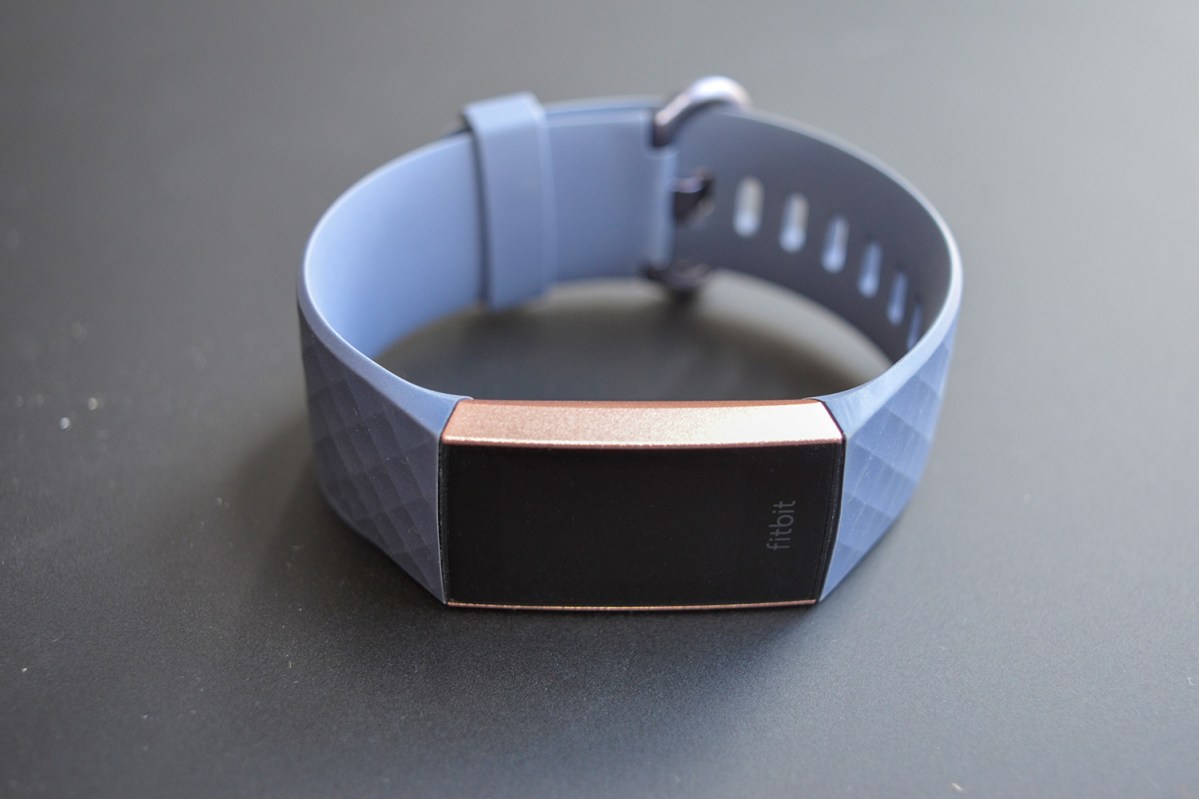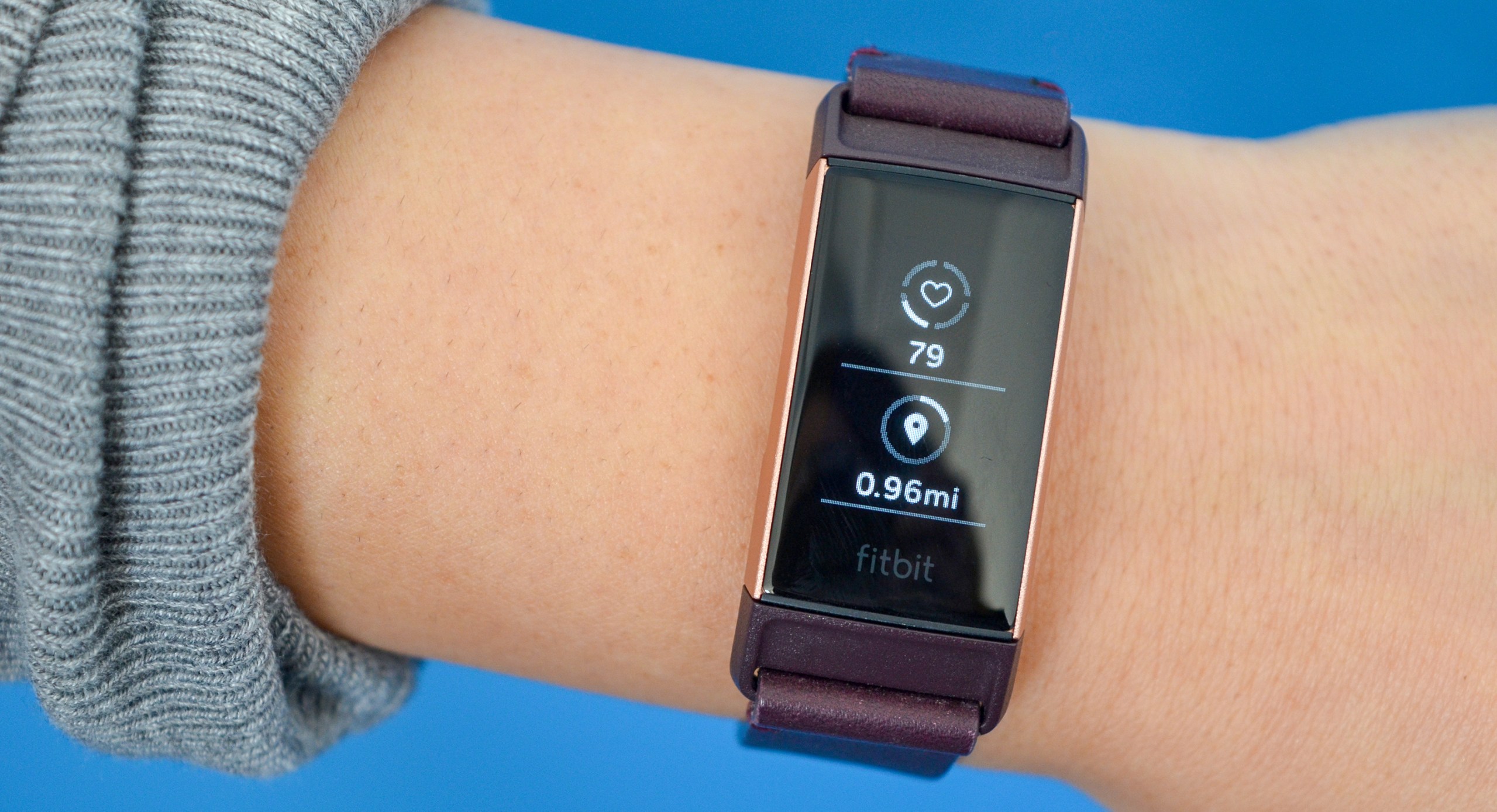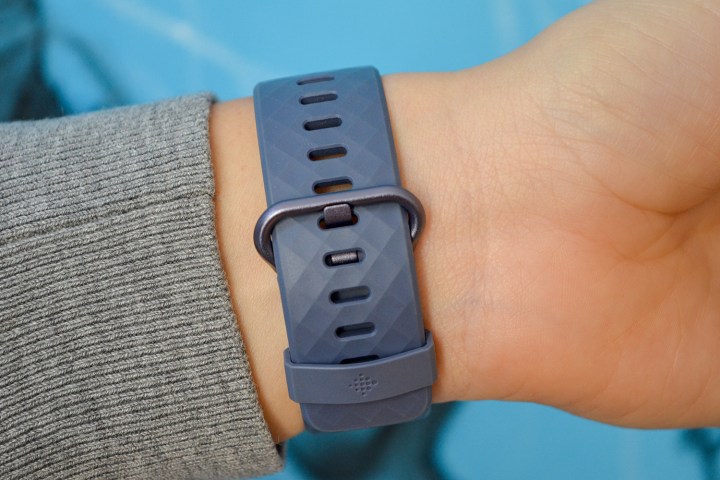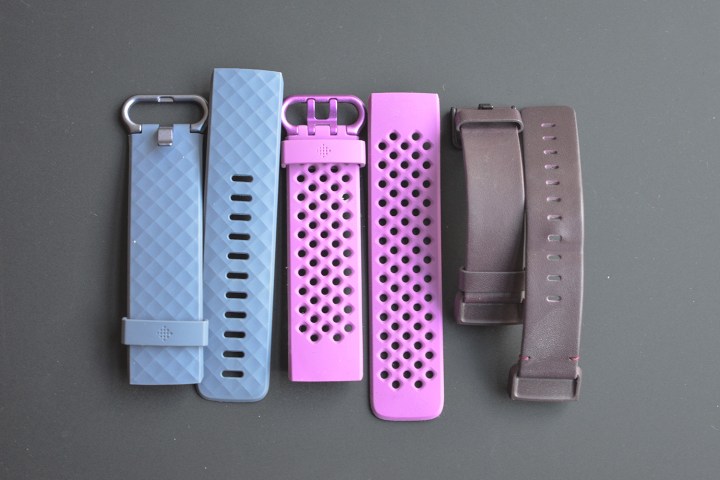- Lightweight case, stylish design
- Offers smartphone notifications
- Excellent battery life
- Touchscreen display
- Interchangeable watch straps
- Not fully compatible with iOS
- No built-in GPS
- Touchscreen slightly unresponsive
Want a great price on fitness tech this holiday season? Check out our favorite Black Friday fitness deals.
The Fitbit Charge 3 was released about a year ago, and it was among our favorite fitness trackers of 2018. It retains that spot to this day. You can find better smartwatches, and better wearables dedicated to specific activities, but the Fitbit Charge 3 remains a great and affordable all-rounder.
With excellent battery life, an affordable $150 price tag, and a touchscreen display, the Charge 3 is a fitness tracker you can wear all day in a meeting and in the gym.
Let’s take a closer look at exactly what the latest Fitbit fitness tracker has to offer.
Lightweight, sleek look
To get that sleeker, compact design, Fitbit trimmed down the aerospace-grade aluminum case of the Charge 3. As we found with the Fitbit Versa, the company has done a good job making a case that doesn’t look too big on a woman’s wrist or noticeably small on a man’s. The concave back makes the whole thing look deceptively thinner than the typical smart wearable.

While the physical changes are subtle, it still makes a difference aesthetically when on the wrist. Regardless of whether you opt for a leather or silicone watch band, the Charge 3 looks impressive for a fitness tracker. Of course, wearing it with formal wear is pushing the boundaries but we didn’t have an issue pairing it with a casual outfit or even one that’s on the dressier side — we even got tons of compliments on it.
Fitbit swapped out the physical button that was originally seen on the Charge 2, for an inductive button with haptic feedback. Aside from swiping through the display (which we’ll get to later), the button is essentially your “back” button — when you want to go to the previous screen. It’s also what you press every time you want to get back to the home screen.
Alternatives
The inductive button is extremely responsive, although it might take you a while to become accustomed and use it rather than automatically using the touchscreen. We like the fact that because it isn’t a physical button that sticks out, it allows the Charge 3 to have a streamlined design. We wish all fitness trackers and smartwatches would adopt this “buttonless” design. You can also adjust how sensitive you want the button to be, as well as the intensity of the vibrations.
Wearing it throughout the day or during a workout, we love how lightweight the Charge 3 is. Fitbit says the Charge 3 is 20 percent lighter than the Charge 2, and it’s comfortable enough to work out with and to keep on for long periods of time. But only after finding the bands that we thought worked best with the device.

From silicone to fabric to leather by Horween, there’s a band suitable for everyday wear. But we think the classic silicone band is uncomfortable, and too stiff to mold to our wrist in a way that feels like a natural fit. Instead, we opted for the Horween leather band which fit perfectly from the start. As usual with leather, it also becomes more worn down as you wear it — allowing for it to truly capture the shape of your wrist. For working out, we did like the silicone breathable band (that’s punctured with air holes) which was also convenient enough to wear in the shower.
We’re especially glad to find how easy the bands are to swap out. The simple press of a button feels like a cake walk in comparison to the Fitbit Versa which requires you to fiddle with quick release pins.
No more taps, but the touchscreen is unresponsive at times
Navigating through the menus with the Charge 2 means pressing the side button to cycle through the different modes, and then tapping on the display to choose the mode you want, which is a tedious process, even after you get used to it. Charge 3 navigation is much faster because you simply swipe the display to the desired function, while the inductive button serves as the back and home button.
With a tap on the screen, press of the inductive button, or flick of the wrist, you’ll awaken the Charge 3. Unfortunately, we found the touchscreen was a bit unresponsive; sometimes we’d have to tap on it several times to bring the display to life, which can be very frustrating.
The touchscreen was a bit unresponsive when attempting to wake it.
On the home screen, you’re greeted with metrics like the time, step count, or resting heart rate, depending on which clock face you choose via the Fitbit app. A swipe up brings you to your personal dashboard — which is where you can see all your health stats including calories burned, female health tracking, active minutes, and more. You can customize the information you want to see via the Fitbit app. For instance, we weren’t as interested in seeing our active minutes throughout the day as we were the other metrics, so we removed it from our personal dashboard.
Fitbit’s other smartwatches give you an overview of the last seven days, but the Charge 3 only gives you one day’s worth of information. It doesn’t include stats on your last workout either, you’ll have to refer to your Fitbit app for that. Having been accustomed to seeing all of our metrics throughout the week on the Versa, we weren’t sure how we’d feel not having access to as much data — but we actually preferred it. We can only count a handful of times where we wanted to cross reference our steps between a few days but pulling out the app wasn’t a hassle since we always have our phone on us anyway.
Swiping to the left on the display brings you to modes like exercise, relax, timer, alarm, weather, and settings. To view all notifications, swipe down on the display. Fitbit says the Charge 3 has 40 percent more active display than its predecessor, which allows for more content to fit on the screen. Rather than only one mode appearing on the screen, you’ll now see two at a time, which keeps you from having to swipe through as much to get to a specific item.
For the most part, the Fitbit Charge 3 OLED display works smoothly, and content looked vibrant on the screen even with grayscale. While there was no lag when swiping through the different modes, we did run into the occasional lag when swiping through notifications or our personal dashboard. It’s not a huge issue but it’s definitely noticeable.
Basic fitness tracking
Besides tracking and measuring heart rate, the Charge 3 includes an SP02 sensor that measures blood oxygen (it’s a technology that’s also found in the Versa and Ionic). With the SPO2 sensor, the Charge 3 can also monitor sleep patterns. Then there’s Fitbit’s Sleep Score program, which is designed to help you sleep better and is available to owners of any Fitbit device with PurePulse HR tracking. The beta program will open next month.
Since it’s so lightweight, we didn’t mind sleeping with the Charge 3 on but we do recommend turning off notifications and ‘Screen Wake’ by holding down the inductive button. That way, it won’t wake you up throughout the night. Once you sync the Charge 3 to the Fitbit in the morning, you’ll be able to see an in-depth analysis showing time spent in light, deep, and REM sleep, along with how long we were awake for — all of which we found to be accurate. We’re also happy to see that you can now check your personal dashboard to see how long you slept the night before, after you sync to your smartphone.
Since it’s so lightweight, we don’t mind sleeping with it on at night.
As with the Flex 2, the Charge 3 is water resistant down to approximately 164 feet (50 meters). With a new swim mode, you can track laps and distances in the water; the info is synced with the Fitbit app.
With a new goal tracking feature, you can set specific goals ahead of your workouts. For example, we set a goal of two miles for our run, so the Charge 3 indicated how much longer we had left to go. Once we reached our goal, the Charge 3 vibrated — but we did find ourselves glancing at it, anyways. You can check pace and distance in real-time by swiping through the display when on Exercise mode.
You can also set goals for metrics like calories or time for over 15 different types of exercises. It’s not much different than setting alerts for specific mile markers during runs — for instance, we set our Fitbit to alert us for every half mile we covered. Throughout the day, you’ll also get reminder alerts to move if you haven’t reached 250 steps within the hour.

Unfortunately, the Charge 3 doesn’t include built-in GPS, so you’ll need to pair it with your smartphone during those runs (GPS is used for location information, which is necessary to track distance). Fitbit said incorporating GPS would have left no wiggle room for a larger battery and more sensors.
There’s no support for music connectivity either, so we were forced to bring along our smartphone. Fitbit hopes to add music controls for third-party music apps via software updates, which would at least make it easier to change up tunes without needing to take out your phone. Regardless, we’re disappointed to see that in a fitness tracker that can already do this much, we have to rely on our phones to play music.
The built-in heart rate sensor produced similar beats per minute as when we manually tracked our heart rate — for the most part. After one of our runs, we calculated our heart-rate at 124 BPM while the Charge 3 measured it at 139 BPM. Another day that week, we calculated it at 108 BPM while the Fitbit measure our heart-rate at 121 BPM. During the day, it’s more accurate though — especially when it comes to resting heart rate which we found to be spot on with what our WearOS smartwatches have calculated. After our most recent workout, it was the most accurate it’s been — we calculated 160 BPM while the FItbit was at 167 BPM.
Runners will appreciate the new auto-stop feature — every time you wait at a traffic light during a run, the Charge 3 automatically pauses exercise mode until you start running again. But that won’t be out until later this Fall. There’s also a smart track feature that is able to recognize activities after a specific amount of time that you’re able to set through the app.
Useful smartwatch features
The ability to receive smartphone notifications and accept and reject calls with the Charge 3 isn’t new — owners of the Charge 2 are already able see call, text, and calendar alerts when actively paired to a phone. But the Charge 3 also lets you reply to text messages with Android phones and view app notifications, depending on the apps installed on your smartphone.
With Quick Replies, you can send up to five custom or pre-populated replies that are 60 characters or less. Apple iPhone owners can only view incoming text messages. Since we used an iPhone, we were only able to view our notifications.

We also found that we had to manually go into the Fitbit app and toggle on the apps we wanted to receive notifications for. You’ll be able to choose which ones you want to turn on after receiving notifications to your phone once the Fitbit is connected. For now, there are no brand apps available. The Versa and Ionic smartwatches include apps like Starbucks, Huge Lights, and Strava. But Fitibit said it’s working to bring additional functions to the device in the future, via firmware and third-party app updates.
Fitbit did include what it claims are its “most requested apps” — alarm, timer, and weather. Alarms are set through the Fitbit app and sync to the fitness tracker for you. As for weather, you’re able to see about three or four different days at a time depending on your location. The company is also working on building in a new calendar app and the ability to see the Fitbit leaderboard right on your wrist.
Fitbit also offers the Special Edition Fitbit Charge 3. With an NFC chip built in, it will offer the ability to make contactless payments using Fitbit Pay.
Impressive battery life
Unlike the Apple Watch and Google’s Wear OS smartwatches, we particularly love that the Charge 3 doesn’t die by the end of the day. We were able to receive all notifications, track our workouts and sleep, and the watch still managed to last roughly seven days.
We were able to receive all notifications, track our workouts and sleep, and the watch still managed to last roughly seven days.
Packing a tiny, 71mAh battery, Fitbit said the watch should last seven days — and we think that’s accurate. We did use it a lot, testing every single feature, which is likely why it nearly ran out of juice just before the seventh day. But at the same time, it helps that there aren’t many power intensive features — like there are on the Versa. We simply used our Charge 3 to track our outdoor runs and our step count throughout a long, walk-intensive weekend in Chicago.
Since the Charge 3 tracks your basic fitness metrics, (you don’t have the ability to download third-party apps) the main power consumption should be from smartphone notifications. Even at the end of a work day when our device was at 77 percent, it only dropped to 75 percent after tracking a run.
Warranty information
The Fitbit Charge 3 will cost you $150 for the black silicone sports band with a graphite aluminum case, or blue gray band with a rose gold aluminum case. The Fitbit Charge 3 Special Edition with Fitbit Pay is priced at $170 for the frost white silicone band with a graphite case, or lavender Horween woven watch band with a rose gold case. The Special Edition also comes with an extra black band in the box.

Since the watch bands are interchangeable, you can also purchase additional ones. For $30, there are the classic bands in black and blue gray. For the same price you can also purchase the silicone sport bands in black, berry, navy, and scarlet. Woven bands are available in charcoal and periwinkle, for $35, while the Horween leather bands in midnight blue and plum are $50.
Fitbit offers a 45-day money back guarantee and a one-year limited warranty, which covers manufacturer defects.
Our Take
The Fitbit Charge 3 is a comfortable and sleek fitness tracker, that also brings smartwatch notifications to your wrist and packs a battery that keeps the device going for almost a week. Its heart rate and in-depth fitness tracking capabilities make it worth the $150.
Is there a better alternative?
Yes — but you have to spend significantly more.
If you’re looking for a more feature-packed Fitbit, then there’s the Fitbit Versa — the company’s latest smartwatch. For only $50 more than the Charge 3, the Versa has a 1.34-inch LCD display, interchangeable watch straps, and tons of fitness features, all packed into a beautiful design
For Apple users looking for an iOS compatible device, the Apple Watch Series 5 is your best bet. While it is double the price, you won’t have the same limitations that you would with Fitbit when it comes to interacting with notifications.
For more options check out our selections for the best fitness trackers.
How long will it last?
The Charge 3 feels durable and it’s water-resistant, so we think it should last two years or more. Even though the battery already lasts a week, it’s important to consider that it will deplete over time. We also hope Fitbit continues to release updates and follows through with bringing additional functions to keep up with competition.
Should you buy it?
Yes. If you’re seeking a stylish but basic fitness tracker that is also capable of bringing you all of the alerts you need, the Charge 3 is a great choice.








